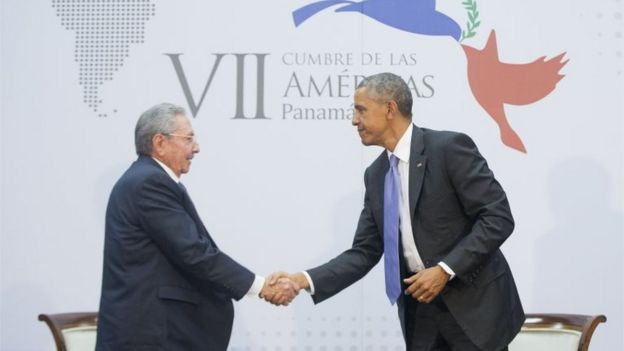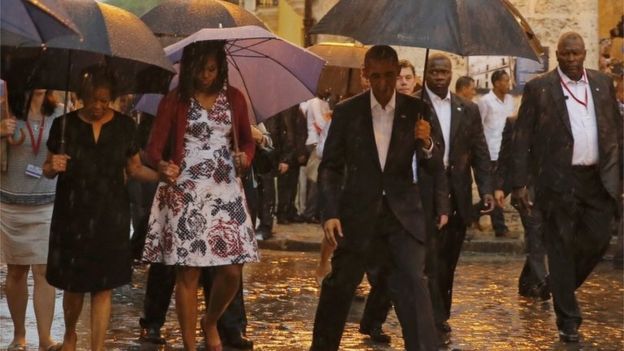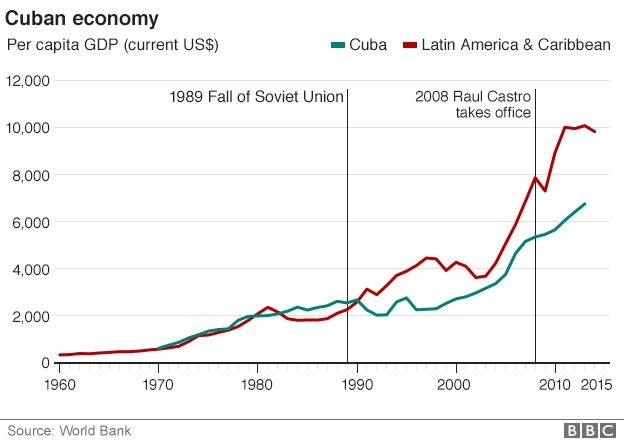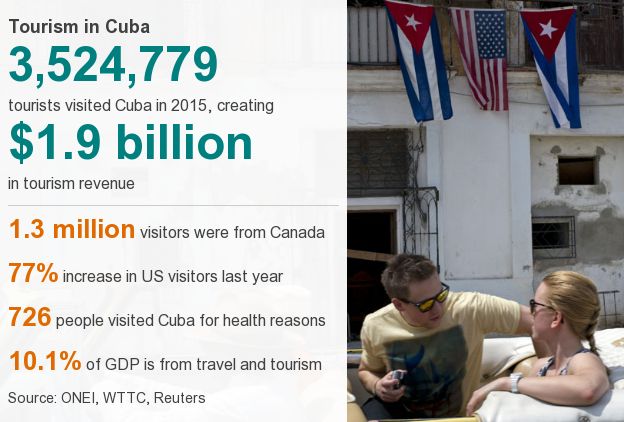- 30 minutes ago
- From the section Latin America & Caribbean
President Barack Obama is in Cuba for a historic three-day visit to the island and talks with its communist leader.
He is the first sitting US president to visit since the 1959 revolution, which heralded decades of hostility between the two countries.Mr Obama said change would happen in Cuba and that Cuban President Raul Castro understood that.
The two leaders are meeting to talk about trade and are scheduled to hold a joint news conference.
Latest updates of Obama's visit
In pictures: Obama in Cuba
Fidel followers remain nervous of thaw
Six sticking points to better relations
Cuba's DIY economy
How times are changing in Havana
Why is the visit groundbreaking?
For a US president to touch down at Jose Marti airport in Havana and be warmly greeted by Cuban's foreign minister was until recently unthinkable.The US broke off diplomatic relations and imposed a trade embargo.
But President Obama undertook two years of secret talks which led to the announcement in December 2014 that the two countries would restore diplomatic relations.
Since then, there have been a series of symbolic moments, such as the first formal meeting of Presidents Obama and Castro at a regional summit in Panama and the opening of embassies in Havana and Washington DC.
What have been the highlights of the visit so far?
Presidents Obama and Castro shook hands at the Palace of the Revolution in Havana ahead of their bilateral meeting on Monday.They seemed visibly more relaxed than at their first official meeting at a regional summit in Panama just under a year ago and smiled broadly.
 Image copyright AP
Image copyright AP  Image copyright Reuters
Image copyright Reuters While the plan to interact with Cubans in the streets was disrupted by a tropical storm, the image of the US president and his family braving the rain demonstrated to many Cubans his commitment to the new, warmer relationship.
What else is in store?
President Obama is due to get down to the nitty gritty of politics in a face-to-face meeting with Cuban leader Raul Castro.Their meeting at the Palace of the Revolution will be closely scrutinised for signs of how much practical progress has been made.
Ahead of the meeting, President Obama said he believed that "change is going to happen here and I think that Raul Castro understands that".
He also told US broadcaster ABC that he would be announcing that Google had made a deal with the Cuban authorities to expand Cuba's poor wi-fi and broadband access.
Internet access still restricted in Cuba
There have been a series of other agreements between the two countries since the thaw was announced, including commercial deals on telecoms and a scheduled airline service, increased co-operation on law enforcement and environmental protection.
Many Cubans are hoping their economy will receive a further boost from further openness and reforms as well as US investment.

On Sunday, US hotel company Starwood announced it had become the first US firm to agree a deal with the Cuban authorities since the revolution of 1959.
The company said it would be making a "multimillion-dollar investment" to bring three Cuban hotels "up to our standards".

What could possibly go wrong?
While President Obama's agenda was carefully discussed with Cuban officials, one thing the White House has insisted on is a meeting between the president and Cuban dissidents, whether the Cubans like it or not.Among them are expected to be members of the Ladies in White, a group which campaigns for the release of political prisoners.
The meeting between the dissidents and Mr Obama is scheduled for Tuesday.
Another main sticking point between the two countries is the 54-year-old US trade embargo.
While strolling through Havana's old town on Sunday, one Cuban shouted: "Down with the embargo!"
The problem for Mr Obama is that it can only be lifted by the US Congress, which is controlled by Republicans who have expressed their opposition to its removal.
On the Cuban side, analysts say there are conflicting sentiments within the Communist Party over hosting Mr Obama.
The Director General of the US division at the Cuban Foreign Ministry told the BBC's Will Grant that "matters of sovereignty of the Cuban people" would remain firmly off the agenda.
The elder Castro has only made one official statement about the thaw in relations, and it was hardly a ringing endorsement: "I don't trust in the United States' policy, nor have I exchanged a word with them".

No comments:
Post a Comment